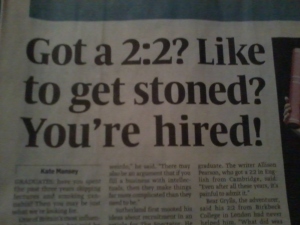Today i woke up to the news that many young people who are unemployed feel like they have nothing to live for. A survey by the Prince’s Trust says that “almost a third of long-term unemployed young people have contemplated taking their own lives”. (See http://www.bbc.co.uk/news/education-25559089 for the full story.)
I agree that unemployment can have a damaging effect on your state of mind, mainly because having no purpose in life, no money and nothing to get you out of bed in the morning can seriously damage your self-esteem, confidence, and sometimes your relationships with others, especially those who have jobs.
Having no work life to discuss with your friends, and no income to spend on fun things or even just to pay your bills, can really make life unbearable.
My Situation
I’ve always said that i would never go on the dole, and so far i have managed not to. It is too easy to rely on others and going on benefits feels like i would be giving up. I don’t like asking for help. I want to be independent.
I left my last job nearly 5 months ago. Originally, i moved back home after graduating and took a part-time job to pay my way through a Masters degree. It was supposed to a temporary thing until i graduated with my Masters and got a “proper” job. After spending almost 3 years doing the job (2 of which were after my graduation and ended up being full-time), i was thoroughly fed up with doing a skill-less job which paid minimum wage. I did housekeeping, which i have nothing against, but through the mixture of being constantly knackered through doing such a physically demanding job, the upheaval of a management re-arrangement, and generally feeling stressed from being over-worked, i was bordering on falling into depression. Never mind that i was applying like crazy for jobs and getting a constant flow of rejections.
I left my job for the sake of my health, both mentally and physically. I don’t regret it. I needed to get out, otherwise i’d have nothing pushing me towards a new and better job which i want to do. I am much happier since leaving and have been having a nice break and seeing my friends more, going on holiday and working out my next step.
Therefore, i can’t moan about being unemployed when it was my own choice to leave. I thought the decision through before i made it, and made sure i had sufficient savings to live on for a few months until i could get something else. So i am living on my savings and not on the dole.
I am trying to stay positive that i will find something else, whether it is a graduate job or another unskilled job. And hopefully not too far in the near future (for the sake of my savings).
However, i still have days where i don’t think i will ever get a job, mainly because potential employers might think my reasons for leaving my last job were poor and then hold it against me, or because neither of my degrees have prepared me sufficiently for the world of work, or because i’ve had so many rejections that it just seems pointless trying.
I have a wall calendar with all 12 months of the year spread out on one page. Looking at those 365 empty white squares is enough to make you panic when you have no job to fill them. It’s easy to make plans but harder when you haven’t got the funds to do everything you want to do. At the end of the day, suddenly it hits you that all you want to do is work.
Experience and Education
The most annoying thing is that many employers won’t give you experience if you don’t have experience. It’s a vicious circle.
Being a university graduate doesn’t necessarily mean that you will get a job, and this is something that needs to be stressed to any young person considering going to university. I thought it would help me get a job, but no-one told me that i need to be more well-rounded during my university years, instead of only using that idea on your UCAS application to get you INTO university. I have the particular problem of having studied English, a “soft” option, which means i ought to have tried harder to get more experience during my studies.
Careers services at school and university didn’t really help me: nothing really jumped out at me and made me think “i want to do that as a career”. Not knowing what to do with my life has stopped me from pushing towards things as much as i could. I always try my hardest but uncertainty has held me back. I probably didn’t need to do my Masters degree either.
The country might be picking itself back up after the recession, but the job market is only getting stronger slowly. The government just wants people to go to university and it felt like the thing to do, so no wonder i felt forced into going to university in the first place.
What bugs me is that the Duke of York has spoken out about apprenticeships and university by saying “Coming out of university there’s a tendency to believe that you’re trained as well as educated, which is not actually true“. (See http://www.telegraph.co.uk/education/10545162/Duke-of-York-enters-education-debate-by-saying-university-should-be-icing-on-cake-rather-than-direct-route-to-jobs.html) I think you’ll find that i was trained for a job by my Master’s degree, if not by my undergraduate degree.
He also says: “In some respects I think that choosing the apprenticeship path and doing a foundation degree and then going on to university you will always have the advantage over many of your university colleagues because you have earned your spurs in the business world before going to university, so you’re going into university as a trained person, you’re not coming out as an untrained person.”
Erm, when are young people supposed to do this apprenticeship thing when the government now wants to make school education compulsory until 18, instead of 16? And it seems slightly more complicated to go university when you’re a mature student. Also, university might teach you something totally different to what you learned on an apprenticeship? or you might forget the things you learned during your apprenticeship? Maybe these are pointless to mention but you have to consider that the Duke of York didn’t go to university himself, so how can he have an opinion on it?
You might agree with my thoughts, or you might disagree, but there’s a lot to think about when it comes to these issues.

